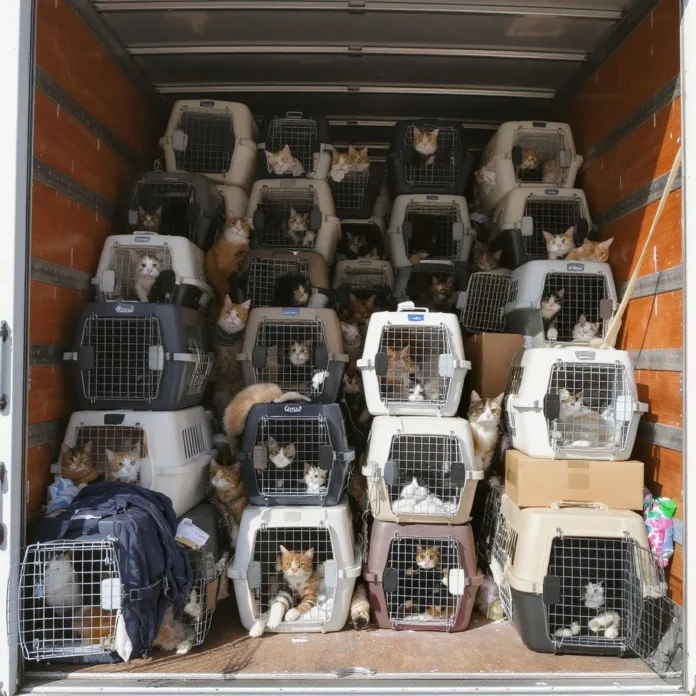Cat Chaos in California: Woman Arrested After 134 Cats Found in U-Haul
By David LaGuerre-
A Mobile Catastrophe Unfolds
In a heartbreaking and bizarre case, California authorities arrested a woman after discovering 134 cats crammed inside a rented U-Haul truck parked in a commercial lot. The discovery was grim: 28 of the cats had died, and dozens of others suffered from dehydration, respiratory infections, and malnutrition. This mobile cat-astrophe, as some have dubbed it, lays bare the complex challenges of animal hoarding and the urgent need for humane interventions.
Local law enforcement arrived after neighbors reported a foul odor and suspicious activity. Officers were shocked by the overwhelming stench and the sheer number of animals. The surviving cats were taken to area shelters and rescues for emergency care, while the woman — whose name has not been released pending further investigation — was charged with multiple counts of animal cruelty.
How Could This Happen?
Animal hoarding is a serious mental health issue with ripple effects for animal welfare and public safety. According to the American Psychiatric Association, hoarding disorder affects up to 6 percent of the population, and it can include an inability to recognize when conditions are unsafe or unsanitary. Cats are especially vulnerable because their small size allows them to be hidden or confined in greater numbers.
A 2023 Pew Research report noted that animal welfare agencies across the United States have seen a rise in animal hoarding cases, partly driven by housing insecurity, mental health crises, and the lingering effects of the COVID-19 pandemic. When individuals lose stable housing or social supports, they may end up trying to shelter their pets in unsafe, mobile, or temporary spaces — with tragic results.
The Law and Public Response
California has some of the nation’s strongest animal welfare laws, but enforcement often depends on public reporting. Neighbors play a key role in alerting authorities when animal neglect is suspected. According to the Humane Society, quick intervention saves lives, as hoarding conditions can deteriorate rapidly.
However, there is also a strong push for mental health treatment rather than punishment alone. A Brookings Institution policy brief (2024) argued that communities should invest in mental health services tied to animal control programs so that hoarders receive counseling and support. Simply arresting individuals without addressing underlying conditions can lead to repeat offenses.
Balancing Compassion with Accountability
It’s hard to read about 28 cats perishing in the back of a U-Haul without feeling profound sadness. These animals suffered needlessly, but it is equally tragic that the woman involved may have believed she was helping them. This tension — between protecting vulnerable animals and understanding the mental health dimensions — demands a nuanced response.
Critics of current policy argue that hoarders are too often criminalized without meaningful treatment. But supporters of strong enforcement point to the horrific conditions that animals endure and say public safety must come first. A balanced approach, where mental health care is mandatory alongside animal cruelty penalties, could be the most humane way forward.
Looking Ahead
This case reminds us that our bond with animals, as a society, comes with responsibilities. If we truly value kindness and dignity — for both people and their pets — then we need resources that prevent these tragedies in the first place.
Rescue workers are now rehabilitating the surviving cats, and local shelters are asking for donations and fosters to help them recover. It’s a moment when the community can step up with compassion and action.
Have thoughts about how to better address animal hoarding? Join the conversation below or share this story with a friend — your voice matters.



